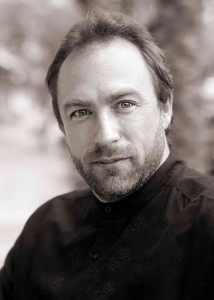‘Jimbo’ is how Jimmy Wales is quite wellknown within the cyber community and there is an interesting story as to how he got this nickname. Years back, when Jimbo was kick-starting the community project (predescessor of Wikipedia), he was looking for a user name or a nickname, since most of the permutations involving his first name i.e., Jimmy were unavailable, he decided to settle on Jimbo, the one nickname that was not. And it has stuck with him ever since.
Over the past few years, there have been quite a few occasions that I got to interact with Jimbo, but due to some odd karmic coincidence, I never got around interviewing him for Dataquest. Thus, when one such opportunity presented itself, I jumped on it. And Jimbo too was kind enough to spare around an hour for a tete-a-tete.
When I called him at his San Francisco home, Jimbo was busy playing some a game on the computer with his daughter and seemed a wee bit unhappy at the onset on being gleaned away from the fun-thing. But as the interview progressed, he sort of warmed up; talking about different aspects of Wikipedia and how the future might pan out for the world’s leading collaborative encyclopedia project. Here is the interview of the Wikipedia man, as it was published in Dataquest.
******
The Power of Collaboration
You was what the Time magazine chose as the Person of the Year for 2006. The choice underlined the emergence of interactive Web or what is more popularly known as Web 2.0; a universe where millions of users communicate and collaborate seamlessly. Of the three instances of Web 2.0 services that were cited, Wikipedia was one of them (the others being YouTube and MySpace). In the intervening years, Wikipedia has only grown in strength, today it is one of the 4th most visited websites in the globe. Every month close to 280 mn people look up Wikipedia for information or to edit the pages.
Jimmy Wales co-founded Wikipedia in January 2001, as an online encyclopedia that could be edited by anyone. Over the last eight odd years, Wales has become an icon for Web 2.0 and has been recognized at various forums as a thinker and an activist. In 2007 the World Economic Forum recognized him as one of the Young Global Leaders that are having a positive impact on the society at large, while numerous other lists have pegged him as one of the most influential thought leaders or scientists.
But, there is no dearth of detractors to Wikipedia as well, with numerous people pointing out flaws in its liberal editing model, or the fact that the information is not really authenticated. Wales has also been targeted time and again for his personal traits, be it the person he is dating or the page he is deleting. Nonetheless, he continues to be a vociferous mascot for Wikipedia, touring across the globe and spreading the message. In an interaction with Dataquest, he speaks about what makes Wikipedia tick and how not only individuals but also enterprises could use it as one of the information sources. Excerpts:
Recently, Wikipedia successfully raised some $6 mn through contribution for running its operations and you also made a very personal appeal in that regards. What really necessitated the personal appeal? Has the downturn had an impact on fund raising?
Fund raising is not something unusual as we do it every year, where in funds are raised for the following year. As we follow a non-profit root, we are dependent on charity from the normal public to run our affairs, so that is pretty usual for us. As far as the personal appeal goes, I make it every year, so that is not something different either.
To be honest, I did not see any specific instance of economic conditions affecting our fund raising. Our users across the globe understand that we need money to survive and hence they donate in whichever way possible. I am very grateful to all those who did, be it slowdown or not.
It has been some eight years since you launched Wikipedia, and it has grown immensely in these years. What is the road ahead for Wikipedia?
Though it has been eight years, I strongly feel that we are just at the beginning of community driven projects online, where thousands of new things evolve over time and we are going to see a lot more projects of this nature over the coming years. People across different fields are getting together to create things and this trend will only increase. So you just wait, there will be a lot more Wikipedia kind of projects in the years to come.
Wikipedia is renowned as an exhaustive source of information but is there a physical limit to the growth, ie, is it possible to get any and every information on Wikipedia?
Well, to start with, there are very different limits to what can go in Wikipedia. First and foremost lets remember that Wikipedia is an encyclopedia, which directly means that there are scores of things that Wikipedia is and is not. Also, we have a strong focus on good quality and that is not possible unless you have good references. Sadly good references are not in abundant quantity, so that puts a limit to what can be achieved or not. Continue reading …


 did not really fit into the scheme of things and had to be discarded. The movie is more important than the sequences, was the implied message.
did not really fit into the scheme of things and had to be discarded. The movie is more important than the sequences, was the implied message.